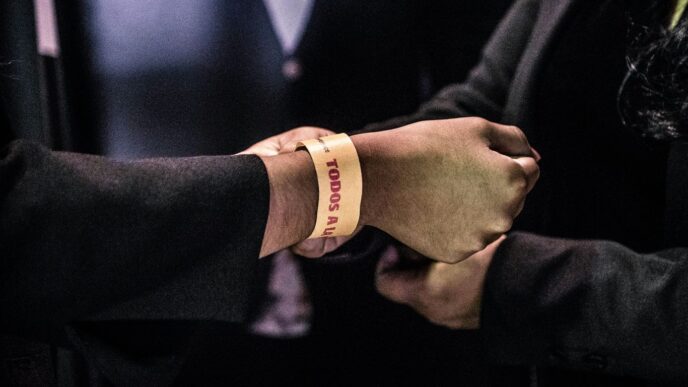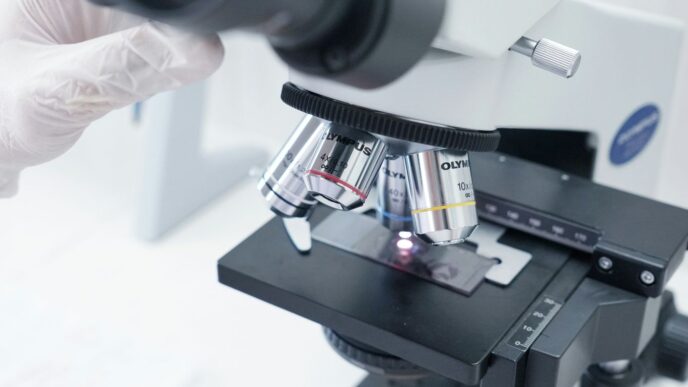We use the word ‘technology’ all the time, don’t we? It’s like our go-to term for all the new gadgets, software, and ways of doing things that pop up. But sometimes, ‘technology’ feels a bit too big, you know? It doesn’t always nail down exactly what we mean. This article is going to explore some different words we can use instead, and why picking the right one actually matters. Think of it as finding the perfect synonym for technology.
Key Takeaways
- Instead of just saying ‘technology,’ we can use words like ‘advancements’ or ‘innovations’ to talk about progress.
- Terms like ‘tools’ or ‘methods’ can highlight the practical side of how things work.
- Looking at ’emerging fields’ or ‘new frontiers’ helps us focus on what’s coming next.
- Considering the ‘human element’ or ‘ingenuity’ reminds us that people are behind these creations.
- Using ‘applied knowledge’ or ‘systematic approaches’ describes the process of turning ideas into reality.
Understanding the Nuances of Technological Terms
Beyond The Common Lexicon
We toss around the word ‘technology’ a lot, don’t we? It’s become this go-to term for pretty much anything new, shiny, or that makes life a bit easier (or sometimes, way more complicated). But honestly, ‘technology’ can feel a bit like a giant umbrella, covering everything from the smartphone in your pocket to the way we grow food. Sometimes, it just doesn’t quite hit the mark when we’re trying to be specific. We need words that paint a clearer picture.
The Broad Scope Of Technology
Think about it. ‘Technology’ can mean a brand-new medical procedure, a complex piece of software, or even a simple, clever tool designed to solve a common problem. It’s a huge category. When we’re talking about something specific, like a new engine design or a different way to analyze data, using a more precise word can really help people understand exactly what we mean. It stops us from sounding too vague.
Precision In Language
So, why bother with different words? Well, using the right term makes our communication sharper. It’s like the difference between saying ‘stuff’ and saying ‘tools’ or ‘ingredients.’ You get a much better idea of what’s being discussed. When we can pinpoint what we’re talking about – whether it’s a breakthrough idea, a practical method, or a scientific application – we avoid confusion and make our points land better. It’s about making sure everyone’s on the same page.
Here are a few ways to think about it:
- Advancements: When something improves on what already exists.
- Innovations: For genuinely new ideas or creations.
- Methods: Focusing on the systematic way something is done.
- Tools: Highlighting the practical instruments or devices.
- Applied Science: When scientific knowledge is used for a specific purpose.
Exploring Alternatives For ‘Technology’
We all use the word ‘technology’ pretty much every day, right? It’s like this catch-all term for all the gadgets, software, and new ways of doing things that shape our lives. But honestly, ‘technology’ can feel a bit… broad. Sometimes it doesn’t quite capture the specific vibe of what we’re talking about. Let’s look at some other words we could use.
Focusing On Progress: Advancements And Innovations
When we talk about things getting better, faster, or more efficient, words like ‘advancements’ or ‘innovations’ really hit the mark. ‘Advancements’ suggests a steady march forward, improving on what’s already there. Think about how car engines have gotten more fuel-efficient over the years – those are advancements. ‘Innovations’, though, feel a bit more groundbreaking. They’re the genuinely new ideas or methods that can change how we do things entirely. The invention of the smartphone, for example, was a huge innovation. It wasn’t just a better phone; it created a whole new way of interacting with the world. Using these terms helps us pinpoint whether we’re talking about a small step forward or a giant leap.
Highlighting Practicality: Tools And Methods
Sometimes, ‘technology’ feels too abstract. We might be talking about something much more concrete, like the actual physical items we use or the systematic ways we get things done. In these cases, words like ‘tools’ or ‘methods’ work wonders. ‘Tools’ can refer to anything from a simple hammer to complex software that helps us build or create. ‘Methods’ gets at the process itself – the step-by-step approach. For instance, a new way to organize a project or a different technique for analyzing data could be called a new method. It’s about the ‘how-to’ rather than just the ‘what’. This is especially true when we’re looking at applied science, which is all about using scientific knowledge to solve real-world problems.
Emphasizing The Future: Emerging Fields
What about the stuff that’s still on the horizon? The ideas that are just starting to take shape? Instead of just saying ‘future technology,’ we can talk about ’emerging fields’ or ‘new frontiers.’ This language paints a picture of exploration and discovery. It acknowledges that we’re in the early stages, perhaps dealing with concepts that are still a bit fuzzy or experimental. It’s about the potential and the possibilities that lie ahead, rather than the finished product. This kind of phrasing is great for discussions about research and development, or when you’re trying to describe the next big thing before it’s even fully formed.
Finding The Right Descriptor

So, we’ve talked about how ‘technology’ is a pretty big word, covering a lot of ground. Now, how do we actually pick a better word when we need one? It really boils down to what you’re trying to get across. Are you talking about the shiny new thing everyone’s buzzing about, or the quiet, steady improvements that make our lives just a little bit easier?
Considering The Human Element
Sometimes, we forget that behind every piece of tech, there’s a person, or a whole team of people, who dreamed it up and built it. Words like ‘ingenuity’ or ‘creativity’ can point to that spark of human brilliance. It’s not just about the circuits and code; it’s about the clever thinking that went into it. Think about it: ‘ingenuity’ suggests a smart, original way of solving a problem, often with limited resources. It’s that ‘aha!’ moment made real.
Describing Applied Knowledge
When we’re talking about using scientific ideas to actually do something, ‘applied knowledge’ is a good fit. It’s the difference between knowing the theory of electricity and actually building a lightbulb. It’s about putting what we learn into practice. This can also be described as:
- Practical application: Using scientific principles for real-world tasks.
- Engineering: The design and building of structures, machines, and systems.
- Methodologies: Specific, systematic ways of doing things.
- Craftsmanship: Skill in making things by hand or with tools.
Systematic Approaches
Sometimes, the focus isn’t on the end product, but on the way things are done. This is where terms like ‘systematic approaches’ or ‘methodologies’ come in handy. They describe a planned, organized way of tackling a problem or creating something. It’s about having a process, a set of steps that are followed to achieve a result. This can be really important when you’re talking about research, development, or even just improving how a business operates. Choosing the right descriptor helps paint a clearer picture of the ‘how’ behind the ‘what’.
Synonyms For Specific Contexts
Sometimes, the word ‘technology’ just doesn’t cut it. It’s a bit like using ‘food’ when you really mean ‘gourmet meal’ or ‘snack.’ You need a word that paints a clearer picture, right? Let’s break down some more specific terms we can use depending on what we’re actually talking about.
Cutting-Edge Innovation
When you’re talking about something brand new, something that’s pushing boundaries and hasn’t really been done before, ‘innovation’ is a solid choice. It implies a fresh idea or a new method that solves a problem in a novel way. Think of it as the spark that lights up a new path.
- A truly new invention.
- A creative solution to an old problem.
- Something that changes how we do things.
Pioneering Tech
This is where we get into the really forward-thinking stuff. ‘Pioneering’ suggests being among the first to explore or develop something. It’s about leading the way into uncharted territory. It’s not just new; it’s groundbreaking.
- Early-stage development.
- Research into new fields.
- Ideas that are just starting to take shape.
Applied Science
Sometimes, what we’re dealing with isn’t just a cool new gadget, but the practical use of scientific knowledge. That’s where ‘applied science’ comes in. It’s about taking what we learn from labs and theories and turning it into something useful in the real world. It’s the bridge between discovery and application.
| Field of Study | Practical Application |
|---|---|
| Biology | New medical treatments |
| Physics | Advanced materials |
| Computer Science | Efficient algorithms |
| Chemistry | Sustainable energy solutions |
The Importance Of Precise Language
Avoiding Generic Terms
Look, we all use ‘technology’ a lot. It’s like the default setting for anything new and shiny, or even just a different way of doing things. But sometimes, that word is just too big. It’s like trying to describe a specific type of bird by just saying ‘animal’. You’re not wrong, but you’re also not really saying much, are you? When we just stick to ‘technology’, we miss out on the chance to really explain what we mean. It’s a bit like using a blunt tool when you need a scalpel – it gets the job done, sort of, but it’s messy and lacks detail.
Enhancing Communication Clarity
Using more specific words makes it easier for people to get what you’re talking about. Think about it: if you say ‘advancements’ instead of just ‘technology’, you’re immediately signaling that you’re talking about progress. If you say ‘tools’ or ‘methods’, you’re pointing to the practical side of things. It’s about painting a clearer picture. The right word can stop confusion before it even starts. It helps everyone be on the same page, which is pretty important when you’re trying to explain something new or complex.
The Impact Of Word Choice
What we say matters. It shapes how people think about things. If we’re always talking about ‘technology’ in a vague way, people might just tune out. But if we use words that highlight the human ingenuity behind it, or the practical applications, or the sheer progress being made, we can get people more interested and informed. It’s not just about sounding smart; it’s about making a connection and getting your point across effectively. It’s like choosing the right ingredients for a recipe – the right words make the whole dish better.
Navigating The Spectrum Of Change

Sometimes, new ideas just make things a little bit better. Other times, they completely flip the script. It’s like the difference between getting a slightly faster internet connection and suddenly having the whole world at your fingertips through a smartphone. Not all changes are created equal, and understanding these differences helps us talk about them more clearly.
Incremental Improvements
These are the small steps, the tweaks that polish what’s already there. Think about your phone getting a software update that makes your camera slightly better, or a car model that boasts a few more miles per gallon than the last one. They’re good, they keep things moving forward, but they don’t usually make you rethink your whole life. They build on existing ideas, making them more efficient or user-friendly.
- A new version of an app with a cleaner interface.
- A car engine that uses a bit less fuel.
- A software patch that fixes a minor bug.
Disruptive Innovations
Now, these are the game-changers. These are the ideas that don’t just improve something; they create entirely new ways of doing things, often making older methods look obsolete overnight. The internet, smartphones, streaming services – these didn’t just tweak the old ways, they rewrote the rulebook. They can be messy at first, maybe not perfect, but they have this power to reshape entire industries and how we live.
| Type of Change | Description |
|---|---|
| Disruptive | Creates new markets or significantly alters existing ones. |
| Transformative | Fundamentally changes how we understand or perform tasks. |
| Revolutionary | Leads to entirely new fields or ways of living and working. |
The Cycle Of New Ideas
New concepts don’t just appear fully formed and instantly popular. There’s a whole process. Some ideas are brilliant but never catch on. Others start small, maybe even a bit rough, but grow to change everything. It’s a mix of invention, adaptation, and sometimes, just plain luck. We see scientific principles turn into practical tools, and those tools evolve, sometimes in ways nobody predicted. This constant flow of new thinking and application is what keeps the world moving, for better or worse. It’s about imagining what’s next and figuring out how to make it work, then seeing how people actually use it, and then, well, the cycle starts again with the next big thing.
Wrapping It Up
So, we’ve looked at a bunch of different words we can use instead of just saying ‘technology’ all the time. It turns out, there are lots of ways to describe the new tools, methods, and ideas that pop up. Whether it’s an ‘innovation’ that’s totally new, an ‘advancement’ that makes something better, or a ‘methodology’ for getting things done, picking the right word can make what you’re saying much clearer. It’s not just about sounding smart; it’s about really getting your point across and understanding how these changes affect our world, from the big picture stuff to the everyday gadgets we use. Next time you’re talking about something new, try reaching for a more specific word – you might be surprised how much better it sounds.














